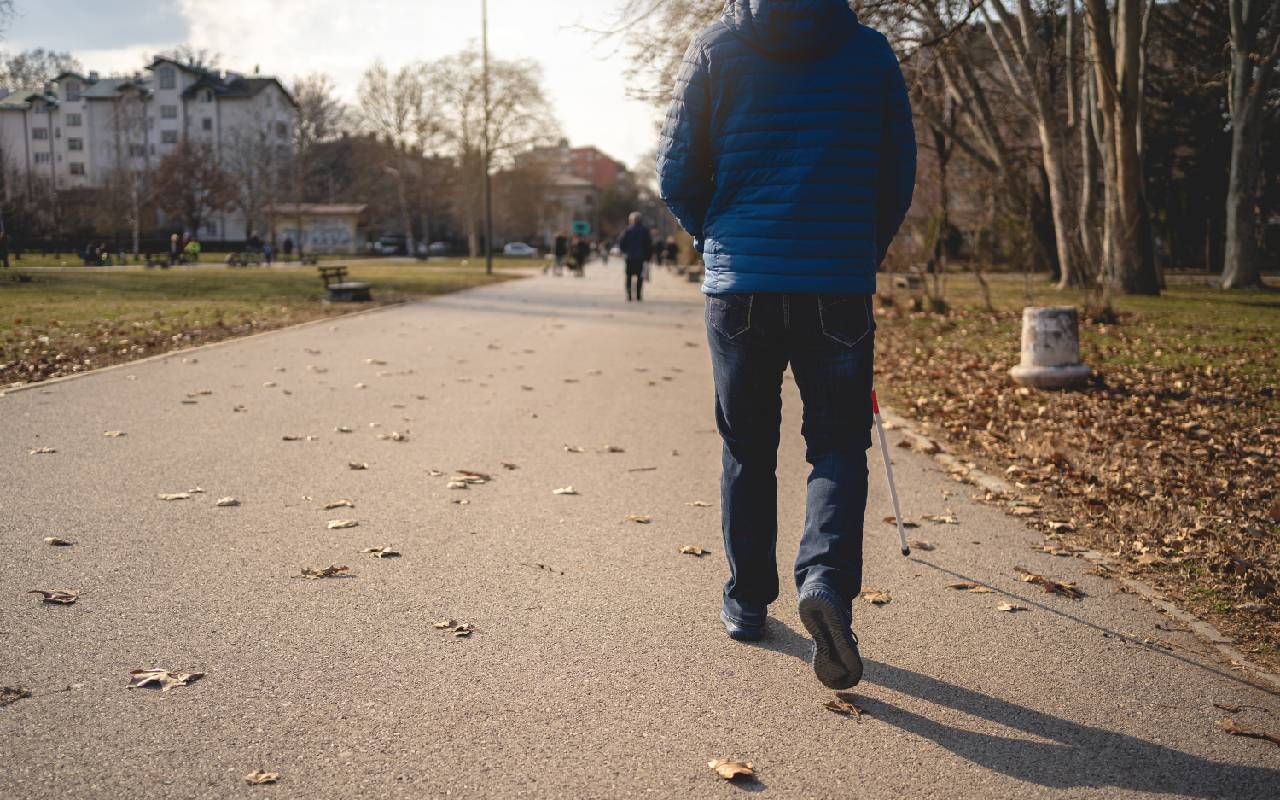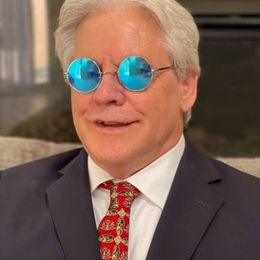A Life Worth Living: Adapting to Vision Loss Later in Life
Blind since 2021, I’ve grown to accept my disability identity and am committed to learning the skills I need to live independently
Soon after losing my sight, I was sitting in an examination room, where a nurse had just finished taking my medical history. Before leaving, she asked, "Are you OK being alone for a few minutes?" I thought, "Of course I'm OK with that, I'm an adult." Then, her reason for asking hit me. This was the first time I realized fully that others viewed me differently now that I was blind.

I began to lose my sight in 2017, at the age of 60. My vision quickly deteriorated after that. In 2020, I reluctantly resigned from my position as a college professor. By the end of 2021, I was totally blind. Less than one year later, the nurse wondered if I needed someone to watch over me.
I began to lose my sight in 2017, at the age of 60. My vision quickly deteriorated after that.
Other people have shared the nurse's uncertainty about my competence. One reason is that our personal experience tells us that vision is the most important sense for interacting with the world around us. We rely primarily on vision for activities such as driving a car or taking a walk. Our reliance on vision explains why people sometimes say that life would not be worth living if they were blind.
I will argue here that the life of a blind person is well worth living. In fact, blindness can spark a reassessment that can open new possibilities for living a happy, fulfilling and productive life.
A Blind Assault on Identity
In 2019, I was accepted into a vocational rehabilitation (VR) program. A major goal of VR is to learn to live independently with a disability. Some of the VR staff had been blind for most of or all their lives. Their success personally and professionally demonstrated that people who are blind can function effectively in their everyday lives.
The blind VR staff had experienced prejudice and discrimination in many settings throughout their lives, such as in school and work settings. Because of these experiences, they identified as members of a marginalized minority group. In fact, they often spoke of sighted people as if they were "outsiders" — as if they were "other." I objected to this attitude because I did not think of sighted people as "other."
I now understand that I objected because I was not ready to give up my sighted identity. Although I knew I was going blind, I hoped irrationally that sighted people would continue to see me as a competent and independent adult. The challenges of blindness, however, battered what was left of my sighted identity.
Total blindness is a condition in which there is no light perception. Only about 15% of people designated as blind have no light perception.
The anxiety, depression and grief resulting from this assault on identity is captured in the following lament by a 76-year-old woman experiencing sight loss: "When I found out [I was losing my vision,] I felt like my whole world was crumbling from under me and I said how am I going to survive."
By the end of 2018, I, too, had felt like my world was crumbling around me. I could not use my phone, cook meals or clean my house. I felt helpless, frightened and alone.
Most cases of acquired sight loss occur after 50 years of age. This major life change usually leads to reduced life satisfaction and increased depression, which together are referred to as lower "quality of life." The lower quality of life is determined by the stigma of blindness and the loss of control over one's life circumstances.
The Stigma of Blindness
"Blindness" refers to a continuum of visual impairment ranging from "low vision" to "total blindness." Low vision refers to visual impairment that interferes with everyday functioning and that cannot be fully corrected with glasses, contact lenses or surgery. Total blindness is a condition in which there is no light perception. Only about 15% of people designated as blind have no light perception.
Blindness is a stigmatized trait. "Stigma" refers to a trait that lowers a person's perceived social value or worth. In other words, people who are blind are perceived to be deficient or defective human beings.
The stigma of blindness is reflected in social stereotypes. If asked to describe adults who are blind, people often list attributes such as incompetent, dependent, helpless and unemployed. Social stereotypes are culturally transmitted and, therefore, widely known. Thus, stereotypical beliefs about blindness affect both how others perceive people who are blind and how people who are blind perceive themselves.
If older blind adults repeatedly experience social exclusion, they may avoid engaging others socially, thereby further reducing their quality of life.
Older blind adults also must contend with the stigma of older age. If asked to describe the typical older adult, people list attributes such as frail, worthless, senile, isolated and depressed. The combined influence of the two stereotypes may magnify the misperceptions and biased treatment of older adults who are blind.
Even when people consciously reject stigmatizing stereotypes, the stereotypes may still have an unconscious effect on judgments about people from stigmatized groups. For example, a memory lapse that would be ignored in a younger adult might lead others to conclude "mindlessly" that it signals dementia in an older adult.
Stigma causes people to avoid or exclude those from marginalized groups. For example, the instructor of an online course removed me from the roster because she thought that people who are blind cannot do the kind of work I am doing here by writing this article.
If older blind adults repeatedly experience social exclusion, they may avoid engaging others socially, thereby further reducing their quality of life.
In general, without training, blindness limits the ability to take care of one's physical, psychological and social needs. In order to regain control over one's life circumstances, older blind adults need to develop an identity in which their blindness is accepted as a positive part of who they are.
Taking Control: Developing a Disability Identity
As long as I held on to the remnants of my sighted identity, I could not commit fully to the skills training in VR. For instance, I would not practice with my white cane in the neighborhood I had lived in for 30 years because I did not want my neighbors to see that I was blind.
As my disability identity grew stronger, I committed more and more to learning the skills needed to live independently.
In order to end my resistance, I immersed myself in the study of blindness and disability. I joined blind-advocacy organizations, participated in a support group for people who are blind, and studied research by rehabilitation psychologists and disability scholars. Gradually, I developed a disability identity: "Disability identity entails a positive sense of self [and] feelings of connection to … the disability community."
Developing a disability identity is essential for adapting successfully to blindness or any other disability. It is essential because a disability identity guides "people with disabilities toward what to do, what to value, and how to act in various circumstances in which their disability is prominent," according to a study.
People with a blind disability identity do not think of blindness as a deficit. Instead, they see the benefits of blindness — benefits such as feelings of self-worth and a sense that blindness gives meaning and purpose to their lives. For example, my experience of the world around me was transformed by the need to interact with it through only hearing, touch, taste and smell. I felt that I had been transported to an alien world, which ignited my curiosity. Now, I try to share what I learn about this new world with others.
As my disability identity grew stronger, I committed more and more to learning the skills needed to live independently. Learning these skills gave me the sense that I was again in control of what happened to me in my life. This sense of control is known as "self-efficacy."
People with high self-efficacy tend to believe that they can do just about anything they set their minds to. They feel confident that they can achieve their goals by solving problems and overcoming challenges. Improving self-efficacy will do more to improve one's quality of life, especially life satisfaction, than anything else.
Blindness is not a tragic circumstance that brings an end to a meaningful and productive life. Rather, learning to live as a blind person can be highly rewarding because it opens up new domains of human experience and new possibilities for flourishing.
Editor’s note: The author would like to thank Damiana Chiavolini, Ph.D. and J. Kelly Byram, Ph.D. for their editorial comments. He also wants to thank Kiera Feng for her editorial assistance.


